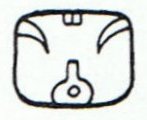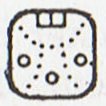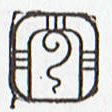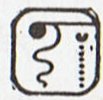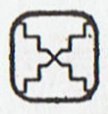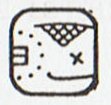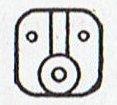|
TRANSLATIONS
The 2nd set of 10 days are presented here:
We will certainly need them later on. Only two comments for the present: 1. Number 15-16 are birds, the only birds among the 20 days. It must be the moon who is flying high those nights:
Beyond death (Miquitzli) the 'season of the sun' is past, and then follows a fortnight with the moon. I wonder if Xoc- in Xochitl (flower) has anything to do with xoc = 'shark'. By recycling the 'alligator' will come immediately beyond the flower. 2. The 20th day name in the Mayan calendar is Ahau (Lord). As I have suggested earlier, the glyph probably illustrates the upside down sign in Likin (east):
Sun dies in the west and is reborn again in the east. His night journey underground takes a 'fortnight', i.e. 14 'hours'. The end of the 'fortnight' connects with the beginning of sun's 6 'hours' above land. The same sign appears again in the east in the morning. The transformation from one 'generation' to the next is accomplished by the 'head' of the old sun reappearing in the son. The name of the 20th day according to the Quiche (1722, ref. Kelley) was Hunaphu. It was the head of One Hunaphu which delivered the new life, by 'spitting' into the 'flower' of Blood Moon. ... And then the bone spoke; it was there in the fork of the tree: Why do you want a mere bone, a round thing in the branches of a tree? said the head of One Hunaphu when it spoke to the maiden. You don't want it, she was told. I do want it, said the maiden. Very well. Stretch out your right hand here, so I can see it, said the bone. Yes, said the maiden. She stretched out her right hand, up there in front of the bone. And then the bone spit out its saliva, which landed squarely in the hand of the maiden. And then she looked in her hand, she inspected it right away, but the bone's saliva wasn't in her hand. It is just a sign I have given you, my saliva, my spittle. This, my head, has nothing on it - just bone, nothing of meat. It's just the same with the head of a great lord: it's just the flesh that makes his face look good. And when he dies, people get frightened by his bones. After that, his son is like his saliva, his spittle, in his being, whether it be the son of a lord or the son of a craftsman, an orator. The father does not disappear, but goes on being fulfilled. Neither dimmed nor destroyed is the face of a lord, a warrior, craftsman, an orator. Rather, he will leave his daughters and sons. So it is that I have done likewise through you. Now go up there on the face of the earth; you will not die. Keep the word. So be it, said the head of One and Seven Hunaphu - they were of one mind when they did it ... The curious appellation 'One and Seven' used for Hunaphu (among others) probably is to be understood as 1 for the daytime and 7 for the nighttime. |
